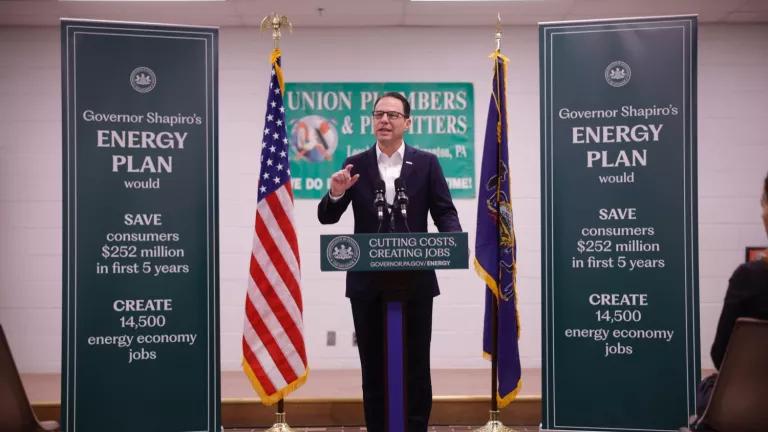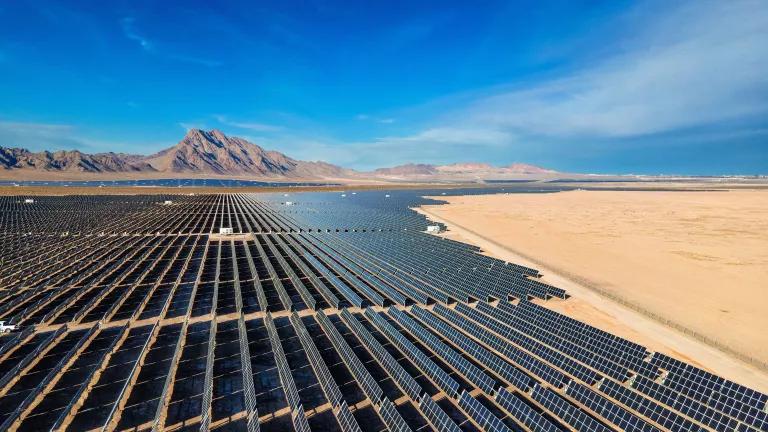American Can Establish a "Clean Growth First" Agenda Abroad
This post is co-authored with Sasanka Thilakasiri, Oxfam America.
The United States, as one of the world’s largest fossil fuel exporters and financiers, plays an outsized role in determining the global trajectory of greenhouse gas emissions. Too much government money is wasted on fossil fuel projects when more responsible uses for the funds are possible. Especially as the world continues to grapple with the COVID-19 pandemic, we must be forward-thinking about the implications recovery and stimulus efforts can have on the energy sector and related carbon emissions. The track record to date is not encouraging—with the majority of energy sector public relief packages in G20 countries going to fossil fuels. In the past four years, government institutions like the DFC (formerly OPIC) have seen significant shifts in their energy investments—reducing renewable energy spending and shifting billions of taxpayer dollars to subsidizing questionable foreign fossil fuel projects with questionable development impacts in Argentina, Jordan, Ghana, Israel, Ukraine, Guinea, Oman, Colombia, El Salvador, South Africa, and Egypt. The US Export Import Bank has insured oil and gas projects in Argentina and recently provided a massive $4.7 billion loan for a foreign-owned LNG project in Mozambique.
President Biden’s climate plan made clear that the incoming administration would “demand a worldwide ban on fossil fuel subsidies” and “seek a G20 commitment to end all export finance subsidies of high-carbon projects.” The plan also made clear: “No financing dirty energy. Biden will ensure the Overseas Private Investment Corporation (OPIC), the Export-Import Bank, and the new U.S. International Development Finance Corporation significantly reduce the carbon footprints of their portfolios.”
A “Clean Growth First” Approach
The next administration should institute a “clean growth first” approach to public investments. As part of President Biden’s climate plan, there is already a plan to create a “Clean Energy Export and Climate Investment Initiative”—moving America in the right direction. The Biden Administration must follow through on its climate plan and phase-out U.S. government support for fossil fuel exports and overseas fossil fuels projects as soon as possible. This means no new fossil fuel projects supported with US taxpayer money. Support for the entire fossil fuel value chain would be prohibited, including for exploration, development, extraction, transport, processing, storage, distribution, consumption, and commercial promotion. (While the prospect is highly unlikely, very rare exceptions for fossil fuel projects intended solely for domestic energy consumption only in Least Developed Countries could be considered, but only after thorough and inclusive scenario analysis of all viable alternatives for meeting energy access is completed, and would require taking into account price competitiveness over the full lifetime of the project, costs of externalities, safety, and adherence to international best practices and environmental and social due diligence - a very high, and likely unachievable threshold, but one that should be at the direction of poor people’s needs.)
The next administration should direct all U.S. government institutions to implement the “clean growth first” policy, including to:
- Establish specific targets and policies for U.S. overseas investments and support at: Ex-Im, DFC, U.S. Trade and Development Agency (USTDA), Department of Energy, State Department, USAID, Millennium Challenge Corporation (MCC), and the Treasury Department. This should include specific targets to phase-out fossil fuel financing as soon as possible and increase zero-emissions technology financing including distributed renewables for energy access and power sector reforms for increased renewable energy penetration in appropriations bills to operationalize these changes.
- Leverage its voice, vote, and replenishment influence within multilateral institutions such as the World Bank Group (International Bank for Reconstruction and Development, International Finance Corporation, Multilateral Investment Guarantee Agency), the International Monetary Fund (IMF), regional development institutions (Asian Development Bank, African Development Bank, European Bank for Reconstruction and Development, Inter-American Development Bank, and potentially the Asian Infrastructure Investment Bank if the U.S. joins), to restrict support for fossil fuels (and accelerate the phase-out of coal)—building on policies adopted by the World Bank and European Investment Bank—and substantially increase funding for low-carbon resilient development through an equitable transition to a low-carbon economy. This could include instructing the Secretary of the Treasury to seek adoption of policies and procedures within all institutions to restrict financing for fossil fuels, following the model of the 1989 Pelosi amendment.
- Set quantitative goals to increase support for renewable energy, energy efficiency, electric transportation, and storage projects overseas, including requisite technical assistance, project preparation, and project finance, with prioritized support for countries seeking BRI funding for high-carbon projects.
- Create clean energy and energy finance positions at embassies in key countries to work on energy transition issues and hire in-country experts to assist in these efforts.
- Engage bilaterally at senior levels to advance the “clean growth first” policy, including with China on BRI and Japan and Korea on the Organisation for Economic Co-operation and Development (OECD) Export Credit Arrangement Coal Sector Understanding and its review scheduled for 2021.
Working with Congress
The Biden Administration will need to work with Congress to mobilize finance that supports multilateral and bilateral action. As the U.S. reenters the Paris Agreement, it will also be essential to mobilize climate finance to spur emissions reductions and build resilience around the world, especially in the most vulnerable developing countries. This is critical not only to enable countries to pursue clean energy, reduced deforestation, and greater resilience, but also to maintain support for a collaborative global effort to address climate change. The next administration should work with Congress to ramp up climate finance to support developing countries’ transition to resilient and low-carbon economies, including to:
- Incorporate the “clean growth first” approach to remove prohibitive riders and increase oversight and approval of funds disbursed;
- Seek to at least double the U.S. contribution to the Green Climate Fund (GCF)—in line with contributions from other G20 members including Germany, UK, and France—to $6 billion and fulfil its $2 billion in arrears pledged during the initial resource mobilization. The GCF is the anchor for finance under the Paris Agreement and is an independent (non-UN) fund that leverages public investment to stimulate private finance and open markets for additional mitigation and adaptation investments;
- Maintain funding for the Global Environment Facility’s (GEF) work to conserve ecosystems at $140 million per year and increase the pledge during the next replenishment in 2022;
- Provide a new contribution to the Least Developed Countries Fund (LDCF) that is dedicated to assisting the most vulnerable countries in developing and implementing national adaptation plans to reduce the risks of climate change;
- Contribute to the Adaptation Fund that supports the Paris Agreement by investing in climate resilience in low-income countries—particularly Small Island Developing States and Least Developed Countries; and
- Provide full funding to bilateral accounts for climate change, including on adaptation, renewable energy, and sustainable landscapes.
The more detailed memo “Greening Official Finance” elaborating on this set of recommendations can be found here.



